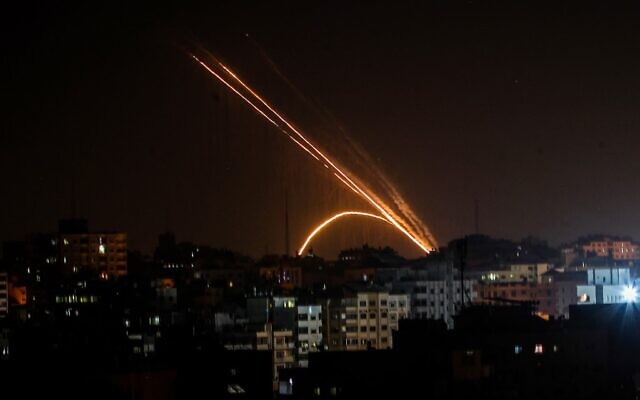After two rockets believed by Israel to have been launched by Hamas were fired toward Beersheba overnight, a spokesperson for the terror group said Saturday that Israel “will not be allowed to choose the time and place of [military] campaigns.”
Hamas spokesperson Fawzi Barhoum added that the decision to carry out military operations remains in the hands of the Gaza terror groups and that “Israel bears the consequences and results of its ongoing aggression,” Hebrew-language media reported.
In a fresh breach of the ceasefire overnight Friday-Saturday, two rockets were fired into Israel from the Gaza Strip, setting off rocket sirens in Beersheba for the first time this week. Hebrew-language media reported that the Israeli security services assessed the rockets were launched by Hamas.
Get The Times of Israel’s Daily Edition by email and never miss our top storiesFREE SIGN UP
Both projectiles were shot down by the Iron Dome missile defense system, the IDF said. The Magen David Adom emergency and rescue service said it treated five people for anxiety and four who were injured while running to bomb shelters following the attack
Significantly, the IDF said it responded to the rocket fire by carrying out strikes on Hamas terror targets in the enclave. During this week’s fighting, Israel traded blows with the Islamic Jihad terrorist organization, while the Gaza-ruling Hamas sat on the sidelines.
In a statement Saturday morning, the IDF said Hamas targets hit in the strikes included a military camp and a compound serving the terror group’s naval forces. In addition, underground infrastructure was also hit. No casualties were reported in the strikes.
“The Hamas terror organization is responsible for everything in the Gaza Strip and will bear the consequences of terror acts carried out against Israeli citizens,” the IDF said.
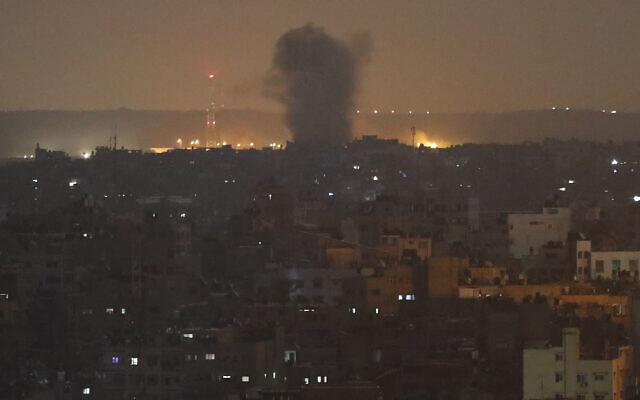
FILE — An explosion caused by Israeli airstrikes is seen in Gaza City, November 14, 2019. (Adel Hana/AP)
The rocket attack came after the leaders of the Hamas and Palestinian Islamic Jihad terror groups spoke and agreed to increase cooperation, Palestinian media reported.
Channel 13 news reported that Hamas chief Ismail Haniyeh and Islamic Jihad leader Ziad Nahala spoke on the phone shortly before two rockets were fired toward Beersheba.
The phone call between Haniyeh and Nahala came after members of the military wings of Hamas and Islamic Jihad held talks in Gaza on Friday, Lebanon’s Al-Akhbar newspaper reported. According to the report, there were angry accusations at the meeting but eventually also an agreement to cooperate. In addition, the newspaper reported that officials in Gaza believe the ceasefire will soon collapse.
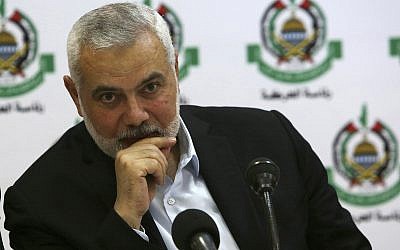 Hamas leader Ismail Haniyeh attends a meeting with foreign reporters at al-Mat’haf hotel in Gaza City, June 20, 2019. (AP Photo/Adel Hana)
Hamas leader Ismail Haniyeh attends a meeting with foreign reporters at al-Mat’haf hotel in Gaza City, June 20, 2019. (AP Photo/Adel Hana)A day earlier, senior Hamas members were twice barred from a mourning tent for the Palestinian Islamic Jihad terror chief whose killing by Israel set off the fighting. The mourners were apparently angry at Hamas after the Gaza-ruling terror group did not take part in the Tuesday-Wednesday flare-up between Israel and Islamic Jihad.
On Friday Hamas acknowledged that one of its operatives had been killed during the fighting this week.
The Izz Ad-Din Al-Qassam Brigades, Hamas’s military wing, said Ahmed Abdel al-A’al was one its members. A statement from the group did not clarify whether he was taking part in fighting when he died.
According to the military wing, al-A’al, 23, and two of his teenage brothers were killed in a “Zionist bombardment” on Wednesday.
The outbreak of violence in the early hours of Saturday morning came as Israelis had started recovering from two days of intense fighting between Israel and Gaza terror groups.
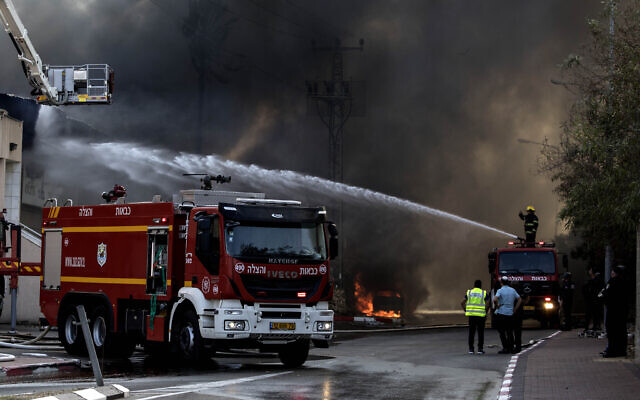 Israeli firefighters battle a blaze at a factory in Sderot, southern Israel, hit by a rocket fired from Gaza, on November 12, 2019 (AP Photo/Tsafrir Abayov)
Israeli firefighters battle a blaze at a factory in Sderot, southern Israel, hit by a rocket fired from Gaza, on November 12, 2019 (AP Photo/Tsafrir Abayov)From the predawn Tuesday to Thursday morning, Israel and Islamic Jihad fought a battle in which over 450 rockets and mortar shells were fired at Israel from Gaza, and the IDF responded with dozens of airstrikes on Islamic Jihad facilities and on the terror cells as they were firing and preparing to launch rockets.
The escalation began when an IDF targeted missile strike killed Baha Abu al-Ata, a commander in the Islamic Jihad terror group who Israel said was the “prime instigator” of terrorism from Gaza over the past year.
Palestinian sources said 34 Gazans were killed in the two days of conflict. Israel said 25 of the fatalities were terrorists; human rights officials said 16 civilians were among the dead.
Fifty-eight Israelis were lightly and moderately injured or treated for anxiety.
Most of the rockets from Gaza either landed in open fields or were intercepted by Israeli air defenses. Some struck homes, businesses and streets, causing injuries and significant property damage. Dozens of people were also hurt as they fell running to bomb shelters.
In response to the attacks, the Israeli military conducted dozens of strikes on Islamic Jihad bases and weapons facilities, as well as rocket-launching teams throughout the Strip. The Hamas terror group, which rules the Strip, refrained from partaking in the violence.
Israel and Islamic Jihad agreed to a ceasefire on Thursday morning, although there were four rocket attacks throughout the day Thursday and the IDF attacked Islamic Jihad targets in Gaza overnight in response.
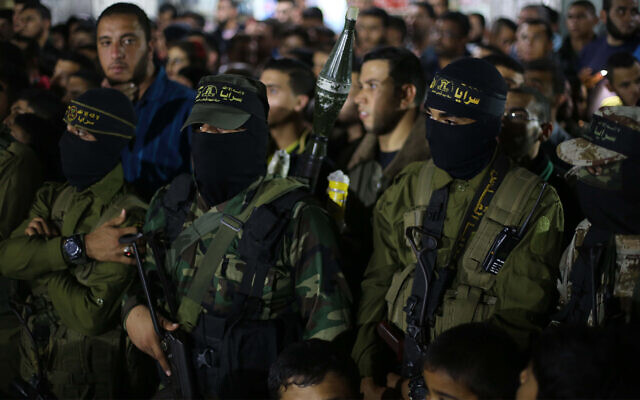
Islamic Jihad terrorists attend a memorial service for one of their number who was killed in clashes with Israel, November 15, 2019. (Hassan Jedi/Flash90)
